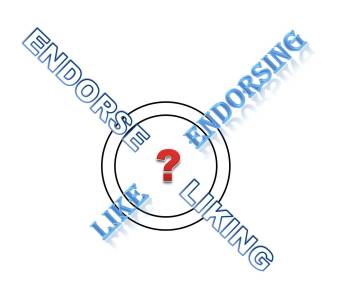We all remember the notorious financial meltdown of 2007-08 that washed away a lot of dreams. We all know why it happened. Some wise (read greedy) people built a huge structure on an extremely very weak foundation (sub-prime mortgage). And then went ahead and added floor over floor to their fantasy at the cost of the masses, till the foundation and everything with it, buckled.
While the ‘Like’ on Facebook (FB) and ‘Endorsements’ on LinkedIn (LI) probably could not, and definitely would not cause any such global shock wave, it is interesting to see how we are adding to its weak foundation, floor by floor, and to see what might happen when it buckles, and buckle it will.
Paid, Forced or Uninformed ‘Likes’ on FB, and ‘Endorsing skills’ without being sure on LI, are really creating a big mountain of unconfirmed information, which at best, is questionable.
Quite some time ago, when I’d see a few hundred likes on an business’s service page on FB, I’d assume it was probably a respectable/ liked business/ service. But once you know that Likes can be bought, or when you get ‘Like Requests’ from friends & acquaintances that almost forced you to like a page (most FB like requests I receive read like this ‘Hi Shrutin, please like this page [link].’), and when you see people around you obliging to such requests, then those hundred likes don’t seem that impressive any more.
On LI, people endorse skills of their contacts. Which, literally is vouching for a skill that your contact claims she or he possesses. I consider vouching a responsibility, especially since that endorsement is public. It means you know, and acknowledge that your contact is good at, or even just knows, the particular skill that you have endorsed them for. And when you get endorsed for a skill by people you haven’t been in touch for a while, and you are dead sure they haven’t a clue whether you even know that skill, that’s when you wonder about the genuineness of similar endorsements showcased on your contacts page. LI’s recommendation option is fine in itself, as contacts recommend based on good interaction or experiences based on past work done; and mentioning it in words gives more credibility than just clicking ‘endorse’ over some key words.
I recently interacted with an eminent person from the social media industry, at a TiE session. He was speaking on the advantages of social media for business. I asked him whether he saw concern over the questionable ‘endorsing on LI’ and ‘Paid/ Forced or Uninformed Likes on FB’ that are creating a false world around us. He, thankfully acknowledged the problem, which meant it existed. And he added that the average person wasn’t affected or bothered much about it, so life would go on at least for a while.
Many people you know might not have a clue as to what exactly you do, or how good you are at what you do. And yet they’ll go endorse you for certain skills. Which, I’ll agree, makes you feel good. And you might be the best your industry has to offer, but knowing that the person who endorsed you for it doesn’t have clue about what exactly you do, doesn’t that make you question the value of the heap of endorsements that you are piling up?
I don’t have any suggestions for the ‘endorsing’ deal on LI, but if you intend to spam inboxes with ‘Like Requests’, here are a few things you could take care of:
- Write what the page/ company/ service is about
- Highlight any achievements, differentiating factors
- Reasons why I might want to like it
- And last, and only if necessary, request the friend to ‘Like’ the page if they find it interesting and if they can relate to it. Also offer to provide them with more information if they are interested
Here’s a recent article that shows how this hype that’s been going strong for a few years now, is not much more than just a hype [Quality over Quantity]

Shrutin,
I like this post. Clicking a like button might be a small act, but if done out of courtesy it is a sugar-coated lie. People should be responsible when they do that.
Thank you Doctor.! You are absolutely right. The reasons vary from courtesy, to requests, to mutual exchange (I like your page, you like my page), and so on. And in the bigger scheme of things, people should understand the pointlessness of it.
Shrutin,
I like this post. Clicking a like button might be a small act, but if done out of courtesy it is a sugar-coated lie. People should be responsible when they do that.